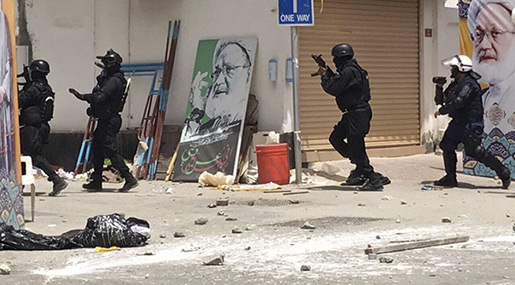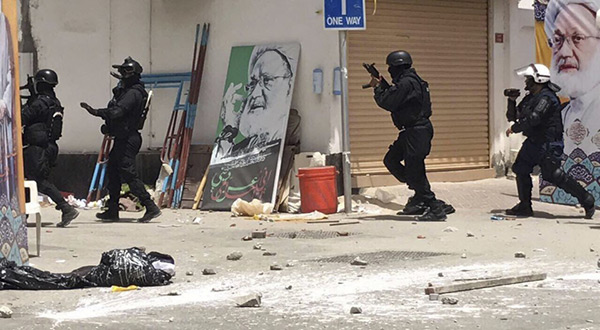
Bahrain Is Using Sectarianism to Deny Social Justice

Fahad Desmukh
Last week, security forces in the Gulf monarchy of Bahrain launched a raid on a makeshift protest camp outside the home of the country's leading Shi'ite cleric, Isa Qasim, to take action against what the government called a "terrorist cell". At least five protesters were killed and 286 people were arrested, making it the bloodiest day in Bahrain since an uprising started in February 2011.

Diraz, the town where Qasim resides, has been in a state of siege since last June, when the government stripped Qasim's citizenship. Protesters began gathering outside his home in support, which the government responded to by blocking all but two roads leading to Diraz, which only residents are allowed to enter, and even shutting down the Internet in the town every night.
In many ways, this latest incident is a repeat of countless incidents in the tiny kingdom, in which the government has suppressed political dissidence under the guise of foiling a secret Iranian-sponsored terrorist cell. However, the targeting of Isa Qasim marks the government's final touches in successfully crushing any organized political opposition, and the conversion of what is essentially a conflict about social justice into a sectarian one.
The movement for popular political reforms in Bahrain has a long history, dating back to the 1920s during colonial rule, and especially after the establishment of the first modern industries following the discovery of oil. Whereas the dominant media narrative today portrays the conflict in Bahrain as fundamentally sectarian in nature, pitting the Shia majority versus the Sunni rulers, this is certainly not the case. From the 1950s through until the late 1970s, the opposition movement to the Al Khalifa government in Bahrain was explicitly trans-sectarian, heavily informed by Arab nationalism and Marxism, and with both Sunnis and Shi'ites at the forefront.
As Sweden-based sociologist Abdulhadi Khalaf has pointed out, the Al Khalifa regime has made the "vertical segmentation" of society the basis of its rule, a tradition partially inherited from British colonial rule. The regime has sought to keep society divided in numerous ethno-sectarian identity groupings that it manages through its chosen intermediaries from each group. The class and civic based opposition movements that arose in the mid-twentieth century were a major threat to this curated order, which the regime sought to crush using violence and by co-opting both Sunni and Shi'ite religionists. An interesting outcome of this strategy was that Iraqi Shi'ite cleric Hadi Al-Modaressi, who the government now accuses of trying to foment a violent theocratic revolution in Bahrain, was actually invited by the government to settle and preach in Bahrain in 1972.
The oil boom in the 1970s gave the Al Khalifa regime the means to both crush and co-opt the secular opposition. With the simultaneous regional decline of Arab nationalism - and the materialization of the Islamic Revolution in Iran - class and civic politics in Bahrain gave way to sectarian and ethnic identity politics, and by the time of the 1990s Uprising, it was Shi'ites who dominated the opposition political scene.
Even then, the Shi'ites and the remains of the secular opposition collaborated together closely in demanding political reform, primarily focused on the restoration of the elected legislature and constitutional rule. The leaders chosen to represent the combined mainstream opposition were carefully selected to represent equal numbers of Sunnis and Shi'ites [and other ethnic and political categories] - a tradition stemming back to the 1950s.
When the most recent uprising erupted in 2011, the government initially targeted those who challenged the regime's narrative of the popular protests as an "Iranian-backed" theocratic movement. This included Sunnis involved in the uprising, such as former military officer Mohammed Albulflasa and Left-leaning politician Ebrahim Sharif, as well as those Shi'ites who had a track record of activism primarily on constitutional and economic issues, such as human rights activist Abdulhadi Alkhawaja, university lecturer Abduljalil Alsingace, and political activist Abdulwahab Hussain.
It was only later that the government fully set its targets on al-Wefaq, the mainstream Shi'ite party that most followers of Isa Qasim give their support to, and very likely the most popular political party in the country. Al-Wefaq was suspended in 2014 followed by the arrest of its charismatic leader Ali Salman. In the past, the government has been visibly opposed to al-Wefaq, yet has tolerated or even benefited by its presence because of its clerical leadership's sensitivity to issues of moral piety and sectarian identity. These issues are leveraged by the regime to distract from, or negotiate on socioeconomic questions that have a wider appeal. An example of this was the issue of the codification of family law in Bahrain in the mid-2000s.
However, after the 2011 protests, it appears as though the regime is willing to take extreme measures to prevent a repeat of the uprising. Today, the organized opposition has been decimated. Almost all of the prominent political and social activists involved in the 2011 uprising are either behind bars or have taken exile abroad, and many stripped of their citizenship. Al-Wefaq and Wa'ad, the political parties who formed the bulk of the mainstream opposition, have been banned. And now attempts are being made to threaten Isa Qasim, the leading Shi'ite cleric in the country. The result is that attempts to form trans-ethnosectarian political alliances again look increasingly unlikely, while the sentiments of religious persecution felt by Shi'ites are exacerbated.
This situation encourages disaffected youth to turn to radical sectarian movements, resulting in the increasing use of disorganized violent tactics by Shi'ite youth against security forces, which in turn boosts support for the regime amongst its traditional allies who fear Iranian influence. This conversion of national socioeconomic questions into identity politics - the 'vertical segmentation' of society - suits the needs of the Al Khalifa regime to maintain its control of power.
The continued political, military and financial patronage of Saudi Arabia and other Gulf allies has been crucial to this maintenance of power.
So too has the lack of any concerted change of stance from the US and Western allies in the aftermath of the 2011 crackdown. When the Trump administration took office this year, it immediately pursued a $5 billion sale of fighter jets to Bahrain which had been held back by the Obama administration due to human rights concerns - a "strain" between the kingdom and the US that Trump has promised to end. This shift in policy was made explicit in Trump's visit to Riyadh, where he sought to take a tougher line against Iran, and specifically praised Bahrain for its anti-terrorism effort during his speech.
On the same day as Trump's meeting in Saudi Arabia, a Bahraini court convicted Isa Qasim of money laundering and sentenced him to a year in jail. Two days later, the government launched the deadly raid on the protest camp outside Qasim's home. News reports indicate that the government buried the bodies of the five men it killed without the knowledge or consent of the families.
With the new Trump administration openly demonstrating its willingness to support the Gulf monarchies against Iran, the Al Khalifa regime has been emboldened, and will likely further play up its claims of Iranian interference in Bahrain.
It appears as though the new status quo of repression in Bahrain will remain for the meanwhile. But as with all other similar conflicts around the world, in apartheid South Africa, Northern Ireland, or Palestine - that are fundamentally tied to class and the distribution of wealth - the question for its current beneficiaries is: how long can it last?
Source: TRT World, Edited by website team
Comments



